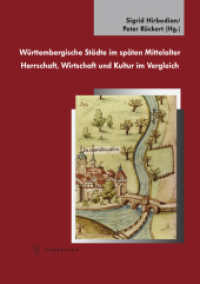- ホーム
- > 洋書
- > 英文書
- > Religion / Ethics
Full Description
Across the world, religious and cultural identities are being weaponised for political gains. South Asia is no exception, with frequent conflicts between faith communities strengthening politico-religious organisations, and severely straining social cohesion. Yet this region also has a history of religious intermingling, exemplified by shared sacred sites such as saints' tombs, temples, churches, and natural elements serving as places of worship.
Such 'sites in common' offer rich insights into the dynamics of religious interaction. This book investigates them through two key questions. First, it examines what shared places of worship can reveal about plural societies in the midst of persistent religious and ethnic nationalism. Are they exceptional? Do they reflect or transcend socio-religious fault lines? The authors approach coexistence as a tensile equilibrium, in which conflict is no stranger to sharing: South Asia's shared sacred sites are seen as social laboratories, where communities experiment with pluralism and its challenges. Second, the contributors consider the politics of belonging, questioning the boundaries between groups and religions. They examine the logics at work in people's visits to places outside their own religious affiliation, challenging theoretical frameworks of religious demarcation and showing the importance of other markers, such as caste, class, language and gender.








